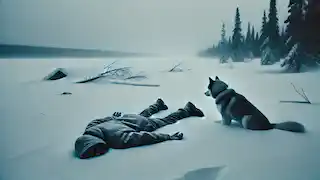To Build a Fire
Reading time: 7 min
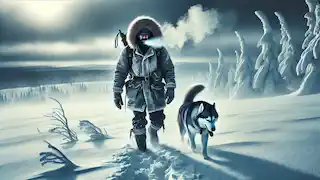
About this story: To Build a Fire is a Realistic Fiction from Canada set in the 19th Century This Descriptive tale explores themes of Nature and is suitable for Adults. It offers Moral insights. A man's desperate battle against the freezing wilderness for survival.
The man was a newcomer in the land, a chechaquo, and this was his first winter. The Yukon lay a thousand miles north, and the day was clear and cold, exceedingly cold, with a temperature down to seventy-five degrees below zero. He walked along the trail on a day that was colder than anything he had ever experienced. His spittle crackled in the air as it froze mid-flight. There was no sun nor hint of it, though there was not a cloud in the sky. It was a clear day, but cold—so cold it hurt.
He was without imagination. He was quick and alert in the things of life, but only in the things, and not in their significances. Fifty degrees below zero meant eighty-odd degrees of frost. Such facts told him that it was cold and uncomfortable, and that was all. It did not lead him to meditate upon his frailty as a creature of temperature, and upon man's frailty in general, able only to live within certain narrow limits of heat and cold. Nor did he think about the need for survival, but only of getting to his destination—a camp where his companions were waiting.
He wore a coat and mittens and thick moccasins, but the cold gnawed at his face, where his breath froze into icy crystals upon his beard. His nose was numb, and his cheeks felt stiff. But there was nothing to worry about, he thought. He’d be at the camp by six o’clock, long before nightfall.
As he walked along the frozen Yukon trail, a husky dog trotted beside him. The dog was native to the land, and it understood the cold better than the man. It did not want to leave the warmth of the campfire where it could curl up in the snow, protected by its thick fur. But the man urged it on, with no understanding of the danger they were both facing.
The trail was faintly visible under the snow. There was no wind to stir the surface, but the cold was overwhelming, creeping through his layers of clothing, down to his very bones.
The First Misstep
Around noon, the man reached a turning point in the trail. Here, the snow was thin, hiding treacherous pools of water beneath the surface. These pools had not frozen solid, despite the intense cold. He was aware of the danger, but he didn't dwell on it. He considered the cold an obstacle, something to be dealt with, but nothing more.
He kept walking, but then, his foot broke through a thin layer of snow, plunging into icy water up to his knees. He cursed aloud, realizing how serious the situation had become. Wet clothing in these temperatures was life-threatening.
He scrambled out of the water and quickly moved to a dry spot. His feet and legs were already feeling numb. He needed to build a fire immediately to dry his clothes and warm himself before continuing on his way. He stopped at a clear patch under some tall spruce trees, where the branches shielded the snow from the ground.
He began collecting twigs and small branches. His hands were clumsy with the cold, and the task of starting a fire was difficult. His fingers were stiffening as the numbness spread up his arms.
Building the Fire
He knelt and carefully arranged the kindling, striking a match against his trousers. The flame flickered, and he nursed it into life. The man was cheered by the sight of the small fire. He fed it more twigs, and soon there was a good blaze. He removed his wet moccasins and socks, holding them over the flames to dry. The warmth soothed his frozen limbs, and he felt confident once again.
But as the fire grew, a small disaster struck. The snow-laden branches above him began to melt. The heat of the fire caused the branches to tremble, and suddenly, without warning, a mass of snow slid off the tree and smothered the flames. The fire was gone, and the man was left in the cold once more.
He groaned aloud in frustration and hurriedly tried to rebuild the fire. He could not afford to waste time, as his feet were already growing dangerously cold again.
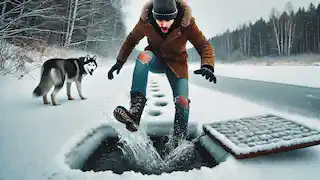
His hands were numb now, and he had trouble manipulating the matches. He fumbled, dropping them into the snow. He swore angrily and retrieved another match from his pocket. He struck it, but his hands trembled, and the flame flickered out before he could light the kindling.
He tried again, with growing desperation. His body was weakening, and the cold was taking over. He managed to light another match, but his numb fingers failed him again, and the fire sputtered out.
The dog watched him silently, its instincts warning it of the growing danger. It knew that this man was in trouble.
Desperation
The man grew frantic. He had to get a fire going. His life depended on it. He tore off his mittens and struck match after match, but his hands were shaking too much. His fingers had lost all feeling, and the matches fell from his hands into the snow.
With numb hands, he tried to pick them up, but it was impossible. His fingers were like clumsy claws, and he could not grasp the tiny sticks. Panic set in, and he realized the gravity of his situation. He could no longer use his hands to save himself.
He knelt over the unlit fire, breathing on the twigs, trying to coax the flame back to life. His breath froze in the air before it could even reach the kindling.
The cold was unforgiving. He was beyond numb now, feeling nothing but an overwhelming lethargy creeping over his body. He knew what that meant—he was freezing to death.
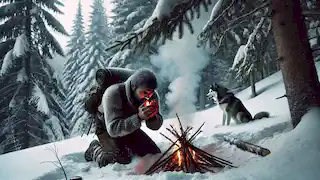
He tried to fight it. He stumbled to his feet and began running down the trail, hoping to reach the camp and his companions before it was too late. But the cold had taken its toll on his body, and he was no longer in control of his movements. His legs felt like lead, and he stumbled over the snow.
The dog followed, its instincts telling it that the man was failing. It whined softly but kept its distance. The man no longer had the energy to call to it.
He collapsed into the snow, too weak to stand. His vision blurred, and his thoughts slowed as the cold claimed him. He was vaguely aware of the dog standing nearby, watching him.
In a final, desperate effort, he tried to crawl, but even that was beyond him now. The cold had won. He lay still in the snow, knowing his end had come.
The End
The dog waited patiently, watching the man with curiosity. It did not understand death, but it sensed that something was wrong. It sniffed the air, waiting for a command from the man, but none came.
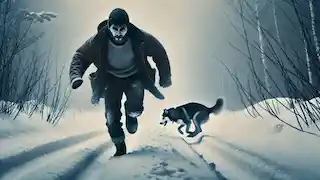
After a while, the dog turned and trotted down the trail, back to the camp where it knew there were other men who could provide warmth and food. The man was left behind, frozen in the snow.
The dog moved with purpose, driven by instinct. It knew the way back to safety, and it would survive, just as it had in the harsh winters before this one.
The cold remained, unrelenting and indifferent, as the man’s body lay still in the wilderness, a reminder of nature’s power and the peril of ignoring its warnings.
